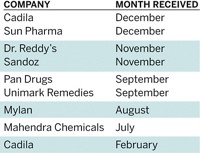Advertisement
Grab your lab coat. Let's get started
Welcome!
Welcome!
Create an account below to get 6 C&EN articles per month, receive newsletters and more - all free.
It seems this is your first time logging in online. Please enter the following information to continue.
As an ACS member you automatically get access to this site. All we need is few more details to create your reading experience.
Not you? Sign in with a different account.
Not you? Sign in with a different account.
ERROR 1
ERROR 1
ERROR 2
ERROR 2
ERROR 2
ERROR 2
ERROR 2
Password and Confirm password must match.
If you have an ACS member number, please enter it here so we can link this account to your membership. (optional)
ERROR 2
ACS values your privacy. By submitting your information, you are gaining access to C&EN and subscribing to our weekly newsletter. We use the information you provide to make your reading experience better, and we will never sell your data to third party members.
Business
New Management For Ranbaxy
Losses prompt parent firm, Japan's Daiichi Sankyo, to appoint new chairman and CEO
by Jean-François Tremblay
June 1, 2009
| A version of this story appeared in
Volume 87, Issue 22
After reporting huge losses stemming from its recently acquired Indian subsidiary, Ranbaxy Laboratories, the Japanese pharmaceutical maker Daiichi Sankyo has appointed new managers to head the unit.
Malvinder Singh, the grandson of Ranbaxy founder Bhai Mohan Singh, has stepped down as the company's chairman, CEO, and managing director. Daiichi appointed Atul Sobti, currently Ranbaxy's chief operating officer, to become CEO and managing director. Ranbaxy board member Tsutomu Une will be the company's chairman.
Since Daiichi acquired two-thirds of Ranbaxy's shares from the Singh family last summer, the Indian firm has been beset with problems. Last month, Ranbaxy recalled all its nitrofurantoin antibiotic capsules sold in the U.S. after discovering that the product did not meet specifications. Also last month, Ranbaxy failed to meet a deadline for delivering the active ingredients in the AstraZeneca drug Nexium, according to India's Economic Times.
FDA has banned about 30 Ranbaxy products from the U.S. because one of the company's plants in India did not comply with current Good Manufacturing Practices. In its latest fiscal year, Daiichi recorded a special loss of $3.6 billion reflecting the drop in value of Ranbaxy's shares.
According to Daiichi's CEO, Takashi Shoda, the changes provide "continuity at the senior management level." Une is responsible for global corporate strategy at Daiichi. Earlier in his career, Sobti was a senior manager at a Honda joint venture in India and thus is familiar with the management style of Japanese companies.
At a press conference in Mumbai, Singh claimed he was not forced out.




Join the conversation
Contact the reporter
Submit a Letter to the Editor for publication
Engage with us on Twitter